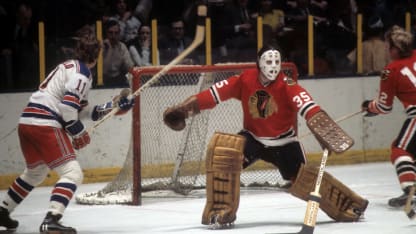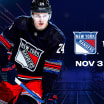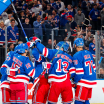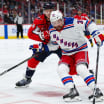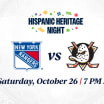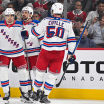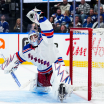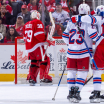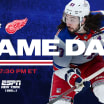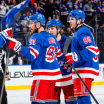SPECIAL TICKET PACKAGE: Join us on 12/2 for an exclusive pre-game meet & greet featuring the GAG Line and then witness Rangers history when Vic Hadfield's #11 is raised to the rafters at The Garden. CLICK HERE TO GET TICKETS »
Vic Hadfield describes himself this way: "I am a Ranger through and through."
He was the captain of the Rangers in the 1970s, the first 50-goal scorer in the history of the franchise, the ultimate teammate - and on Dec. 2, his No. 11 will take its place among the Rangers legends in the Garden rafters.
NYRangers.com will present 11 of the great moments of Hadfield's career, 11 snapshots of the Blueshirts' legendary left winger, 11 for No. 11 - counting down to the celebration of Vic Hadfield Night presented by Budweiser before the Blueshirts take on the Winnipeg Jets on Dec. 2 at Madison Square Garden.
It is one of the most celebrated goals in one of the most famous games in Rangers history: Pete Stemkowski's triple-overtime winner in Game 6 of the 1971 NHL semifinal, beating the Black Hawks, 3-2 at Madison Square Garden, and forcing a Game 7 in Chicago three nights later.
Even if you remember that goal, you may have forgotten how the game reached the extra sessions in the first place, that Vic Hadfield set up both Blueshirts scores in regulation time - one by each of his GAG Linemates - including Jean Ratelle's late equalizer that sent the do-or-die game long into the night.
If those details have slipped your memory, don't worry, you are not alone.
"You know what? I forgot I had two assists in that game," Hadfield told NYRangers.com when the subject of the game came up. "I'm being honest with you: The thing I remember about that game - the only thing I ever cared about - was that Stemmer scored and we won and we got to keep playing."
Ever the ultimate teammate, Hadfield added, "Any personal goals that we were able to achieve, or pats on the back, they didn't mean anything because we were all in this to win."
Vic Hadfield Legendary Moments No. 9: Overtime Heroics
